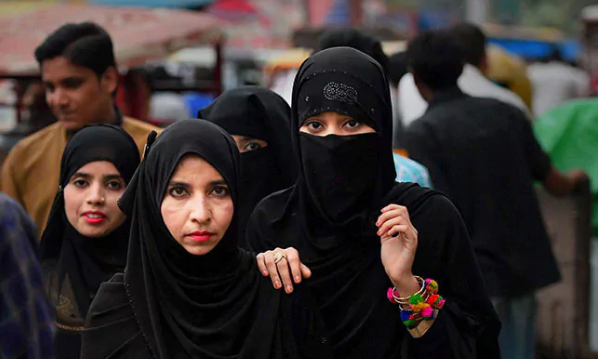BJP’s Strange Obsession With Triple Talaq

Image Courtesy: NDTV. Image for representational use only
The government’s intense preoccupation with the Muslim practice of triple talaq has finally led to a law being pushed through in Parliament. The new law criminalises the act of pronouncing talaq three times in one sitting. Ignoring all other grievances of the Muslim community, the government’s almost single-minded pursuit of this hyped-up issue has led to the situation where Muslim males can be jailed for pronouncing these words that have no legal effect. The Bharatiya Janata Party (BJP) has to thank the brute majority that brought it to power for this.
Triple talaq, for the record, is not permitted in Islam. Many jurists regard it as a social evil that crept in over time. This is not unlike what any other community or social group has gone through. But over the last few years, a well-executed political strategy was carried out to not miss a single opportunity to paint Islam as regressive.
The government has done nothing to counter the growing hostility against Muslims. Instead, it has exaggerated the incidence of instant triple talaq, of which reportedly there have only been around 500 incidents in recent times. This form of divorce, which takes place in a single sitting with three pronouncements made by the man, is a rare phenomenon. However, each such case where talaq is learned to have been pronounced thrice in a single sitting is blown out of proportion.
After the Supreme Court decision in the triple talaq case, this form of divorce is not constitutional in India. After the court’s ruling, India joined a large number of nations, including Islamic countries, where triple talaq in one sitting is disallowed. What is shocking is that even after the Supreme Court order, the government has pursued a Bill that criminalises the mere pronouncement of triple talaq thrice in one sitting.
The Triple Talaq Bill (which has today been given Presidential assent) is yet another reason for the Muslim community to feel battered and shattered. Muslims are lagging behind all other social groups on socio-economic indices. To top it, they lack the confidence to counter the communal propaganda that has been growing since the BJP came to power in 2014.
The triple talaq issue is one of the many distortions and diversions being thrown in the way of the public, so that the sinking economy and shrinking job prospects recede from awareness. Lack of leadership in the Muslim community and the shrinking of space for them on public platforms compounds this grim reality. So much so that that no strong voice has clearly stated that instant triple talaq is an un-Islamic practice. If they do, they are shouted down in the television studios.
Islam has provided clear guidelines, precautions and codes of conduct for divorce which are unfortunately not widely disseminated even among the Muslims.
The late lawyer, Danial Latifi, had detailed to me in an interview in the 1990s when I worked with The Pioneer in Delhi, what had transpired in the Shah Bano case (Ahmed Khan vs Shah Bano Begum, 1985). That case in many ways set the tone for how the issues related to Muslim personal law will be dealt with in India, and therefore has significance even today. This case had generated tremendous attention at the time.
During the course of the interview, Latifi had told me that he came to represent Shah Bano, the Muslim woman who had sued her former husband for maintenance, entirely by accident. “It was not as though I had opted to fight for her [Shah Bano],” Latifi told me. He explained that he had been watching the proceedings of the case in court, which had attracted a galaxy of lawyers, including the then Chief Justice of India, Justice Chandrachud.
Shah Bano’s case was being argued by a junior lawyer and the Chief Justice had intervened and asked Latifi, then a senior lawyer, to represent her. “So, I had no choice but to fight for her,” Latifi told me.
Latifi made it crystal clear that Shah Bano had got maintenance from the court based on the “strength of Quran’s provisions”. He said, “Despite contrary belief, marriage is a very serious business in Islam.” The chapter on talaq in the Quran lays down all the details, including the procedure, for talaq. It gives high importance given to arbitration and maintenance before talaq is pronounced irrevocably.
“The fact is that triple talaq is un-Quranic. In fact, one particular line from the Quran, wa lil mutha laqati mataun bil maroof haqqam alal mutaqqin—unto the divorced woman, a provision that is reasonable in the eyes of God, is obligatory for the righteous,” Latifi pointed out.
Thus, the Quran requires that after divorce a woman must be provided enough for to take care of her needs, as per her status. The court had also ruled that such maintenance must be provided to the divorced woman within the period of iddat, also defined in the Quran. The iddat in this case refers to the compulsory period of separation before a divorce becomes final. In any case, the above lines from the Quran were read out to the Chief Justice by Latifi and that helped the court conclude that Shah Bano was entitled to maintenance. As Latifi told me in the interview: “Shah Bano got her due maintenance on the strength of Quran’s provisions.”
The Shah Bano judgment had upheld the rights of Muslim divorced women to get maintenance but the Congress government of the day, headed by Prime Minister Rajiv Gandhi, sought to undo it by passing a law in Parliament. That law, the Muslim Women (Protection of Rights After Divorce) Act, 1986, put the responsibility of caring for divorced Muslim women on the community. This law, too, was later challenged by Latifi (Danial Latifi & anr vs Union of India).
The present-day dominant narrative on triple talaq has been painting the Muslim men as barbaric and the Muslim women as helpless victims. This, of course, is far from the truth and the evidence lies in how the Shah Bano case was argued by Latifi and the court’s response.
It should also surprise nobody that Latifi was also opposed to the BJP’s push for a Common Civil Code. He said as much in the same interview. He accused the party of making talaq a political issue: “I am not in favour of a Common Civil Code. It is not needed. Also, it has become a political issue and the BJP and its allies are looking for an issue and want to rake it up… I personally feel that the Muslim do not need it.”
****
With this history in mind, it is apparent that the central government, had it been genuinely concerned about the Muslim community or Muslim women, would have reached out to them to improve their pathetic socio-economic conditions. The Sachar Committee report relays a shocking picture of the conditions of Indian Muslims, which has persisted long after the Shah Bano judgment. What but the communal bias in the very functioning of the state machinery has let this situation come to pass.
The scenario will only get more bleak, dark and complex with the passage of the Triple Talaq Bill for it provides a fresh alibi to imprison Muslim men. By threat, force or bullying tactics, Muslim women may be coerced into saying that their husbands uttered talaq thrice in one sitting—even though after the Supreme Court’s ruling that it is unconstitutional, such a divorce has no legal standing. With the husband behind bars, families will be at the mercy of the state too.
The government’s frenzy to have this Bill passed without consulting the community (not just Muslims who are in the BJP-Sangh Parivar fold) will only raise doubts and suspicion. After all, the community has also been pushing for a model nikahnama or marriage contract, and implementation of the laws governing maintenance, both to little or no avail.
Indian Muslims are wary of the dubious stratagems being used to polarise the country. Though they are aware of these machinations, they have little hope that their concerns will be heard.
Humra Quraishi is a freelance journalist and political commentator based in Gurgaon. The views are personal.
Get the latest reports & analysis with people's perspective on Protests, movements & deep analytical videos, discussions of the current affairs in your Telegram app. Subscribe to NewsClick's Telegram channel & get Real-Time updates on stories, as they get published on our website.























